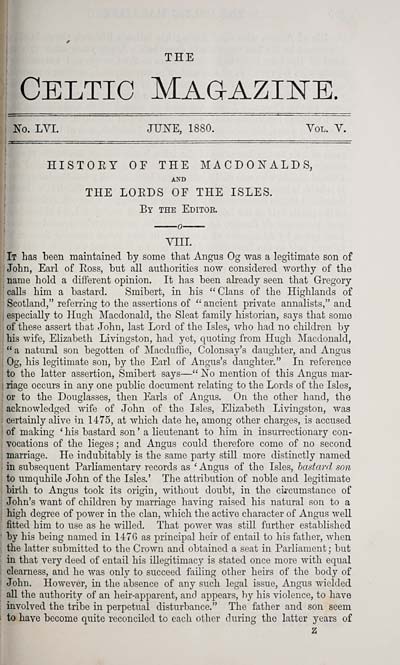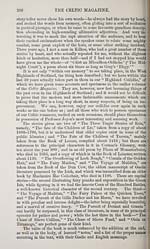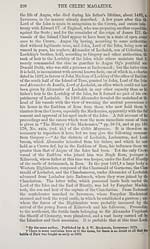Blair Collection > Celtic magazine > Volume 5
(299)
Download files
Complete book:
Individual page:
Thumbnail gallery: Grid view | List view

THE
Celtic Mag-azine.
No. LVI. JU:N"E, 1880. Vol. V.
HISTOEY OF THE MACDONALDS,
AND
THE LOEDS OF THE ISLES.
By the Editor.
VIII.
It has been maintained by some that Angus Og was a legitimate son of
John, Earl of Eoss, but all authorities now considered worthy of the
name hold a different opinion. It has been already seen that Gregory
calls him a bastard. Smibert, in his " Clans of the Highlands of
Scotland," referring to the assertions of " ancient private annalists," and
especially to Hugh Macdonald, the Sleat family historian, says that some
of these assert that John, last Lord of the Isles, A^ho had no children by
his wife, Elizabeth Livingston, had yet, cjuoting from Hugh Macdonald,
" a natural son begotten of Macduffie, Colonsay's daughter, and Angus
Og, his legitimate son, by the Earl of Angus's daughter." In reference
to the latter assertion, Smibert says — " No mention of this Angus mar-
riage occurs in any one public document relating to the Lords of the Isles,
or to the Douglasses, then Earls of Angus. On the other hand, the
acknowledged wife of John of the Isles, Elizabeth Livingston, was
certainly alive in 1475, at Avhicli date he, among other charges, is accused
of making ' his bastard son ' a lieutenant to him in insurrectionary con-
vocations of the lieges ; and Angus could therefore come of no second
marriage. He indubitably is the same party stiU more distinctly named
in subsequent Parliamentary records as ' Angus of the Isles, bastard son
to umquhile John of the Isles.' The attribution of noble and legitimate
birth to Angus took its origin, without doubt, in the cii'cumstance of
John's want of children by marriage having raised his natural son to a
high degree of power in the clan, which the active character of Angus well
fitted him to use as he willed. That power was still further established
by his being named in 1476 as principal heir of entail to his father, when
the latter submitted to the Crown and obtained a seat in Parliament; but
in that very deed of entail his illegitimacy is stated once more with equal
clearness, and he was only to succeed failing other heirs of the body of
John. However, in the absence of any such legal issue, Angus wielded
all the authority of an heir-apparent, and appears, by his violence, to have
involved the tribe in perpetual disturbance." The father and son seem
to have become quite reconciled to each other during the latter years of
z
Celtic Mag-azine.
No. LVI. JU:N"E, 1880. Vol. V.
HISTOEY OF THE MACDONALDS,
AND
THE LOEDS OF THE ISLES.
By the Editor.
VIII.
It has been maintained by some that Angus Og was a legitimate son of
John, Earl of Eoss, but all authorities now considered worthy of the
name hold a different opinion. It has been already seen that Gregory
calls him a bastard. Smibert, in his " Clans of the Highlands of
Scotland," referring to the assertions of " ancient private annalists," and
especially to Hugh Macdonald, the Sleat family historian, says that some
of these assert that John, last Lord of the Isles, A^ho had no children by
his wife, Elizabeth Livingston, had yet, cjuoting from Hugh Macdonald,
" a natural son begotten of Macduffie, Colonsay's daughter, and Angus
Og, his legitimate son, by the Earl of Angus's daughter." In reference
to the latter assertion, Smibert says — " No mention of this Angus mar-
riage occurs in any one public document relating to the Lords of the Isles,
or to the Douglasses, then Earls of Angus. On the other hand, the
acknowledged wife of John of the Isles, Elizabeth Livingston, was
certainly alive in 1475, at Avhicli date he, among other charges, is accused
of making ' his bastard son ' a lieutenant to him in insurrectionary con-
vocations of the lieges ; and Angus could therefore come of no second
marriage. He indubitably is the same party stiU more distinctly named
in subsequent Parliamentary records as ' Angus of the Isles, bastard son
to umquhile John of the Isles.' The attribution of noble and legitimate
birth to Angus took its origin, without doubt, in the cii'cumstance of
John's want of children by marriage having raised his natural son to a
high degree of power in the clan, which the active character of Angus well
fitted him to use as he willed. That power was still further established
by his being named in 1476 as principal heir of entail to his father, when
the latter submitted to the Crown and obtained a seat in Parliament; but
in that very deed of entail his illegitimacy is stated once more with equal
clearness, and he was only to succeed failing other heirs of the body of
John. However, in the absence of any such legal issue, Angus wielded
all the authority of an heir-apparent, and appears, by his violence, to have
involved the tribe in perpetual disturbance." The father and son seem
to have become quite reconciled to each other during the latter years of
z
Set display mode to: Large image | Transcription
Images and transcriptions on this page, including medium image downloads, may be used under the Creative Commons Attribution 4.0 International Licence unless otherwise stated. ![]()
| Early Gaelic Book Collections > Blair Collection > Celtic magazine > Volume 5 > (299) |
|---|
| Permanent URL | https://digital.nls.uk/76452341 |
|---|
| Description | Volume V, 1880. |
|---|---|
| Shelfmark | Blair.6 |
| Attribution and copyright: |
|
| Description | A selection of books from a collection of more than 500 titles, mostly on religious and literary topics. Also includes some material dealing with other Celtic languages and societies. Collection created towards the end of the 19th century by Lady Evelyn Stewart Murray. |
|---|
| Description | Selected items from five 'Special and Named Printed Collections'. Includes books in Gaelic and other Celtic languages, works about the Gaels, their languages, literature, culture and history. |
|---|

